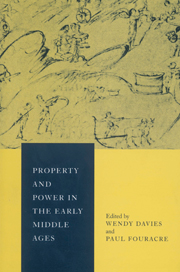Book contents
- Frontmatter
- Contents
- List of maps
- Preface
- List of abbreviations
- Introduction
- 1 The ideology of sharing: apostolic community and ecclesiastical property in the early middle ages
- 2 Teutsind, Witlaic and the history of Merovingian precaria
- 3 Eternal light and earthly needs: practical aspects of the development of Frankish immunities
- 4 The wary widow
- 5 Lordship and justice in the early English kingdom: Oswaldslow revisited
- 6 Adding insult to injury: power, property and immunities in early medieval Wales
- 7 Property transactions and social relations between rulers, bishops and nobles in early eleventh-century Saxony: the evidence of the Vita Meinwerci
- 8 Monastic exemptions in tenth- and eleventh-century Byzantium
- 9 Property ownership and signorial power in twelfth-century Tuscany
- 10 Conclusion: property and power in early medieval Europe
- Glossary
- List of works cited
- Index
5 - Lordship and justice in the early English kingdom: Oswaldslow revisited
Published online by Cambridge University Press: 25 January 2010
- Frontmatter
- Contents
- List of maps
- Preface
- List of abbreviations
- Introduction
- 1 The ideology of sharing: apostolic community and ecclesiastical property in the early middle ages
- 2 Teutsind, Witlaic and the history of Merovingian precaria
- 3 Eternal light and earthly needs: practical aspects of the development of Frankish immunities
- 4 The wary widow
- 5 Lordship and justice in the early English kingdom: Oswaldslow revisited
- 6 Adding insult to injury: power, property and immunities in early medieval Wales
- 7 Property transactions and social relations between rulers, bishops and nobles in early eleventh-century Saxony: the evidence of the Vita Meinwerci
- 8 Monastic exemptions in tenth- and eleventh-century Byzantium
- 9 Property ownership and signorial power in twelfth-century Tuscany
- 10 Conclusion: property and power in early medieval Europe
- Glossary
- List of works cited
- Index
Summary
One of Domesday Book's most celebrated pronouncements is that on the bishop of Worcester's liberty for the triple-hundred of Oswaldslow.
The Church of St Mary of Worcester has a Hundred, called ‘Oswaldslow’, in which belong 300 hides. From these the bishop of that church has, by an arrangement of ancient times, all render from jurisdiction and all customary dues there belonging to his demesne sustenance, both the king's service and his own, so that no sheriff can have any claim there, either in any plea or in any other case whatever. The whole shire testifies to this. (‘Ecclesia Sanctae Mariae de Wirecestre habet unum hundret quod vocatur Oswaldeslaw, in quo iacent ccc hidae. De quibus episcopus ipsius ecclesiae a constitutione antiquorum temporum habet omnes redditiones socharum et omnes consuetudines inibi pertinentes ad dominicum victum et regis servitium et suum ita ut nullus vicecomes ullam ibi habere possit querelam nee in aliquo placito nee in alia qualibet causa. Hoc attestatur totus comitatus.’)
The hide was the standard unit of assessment for taxation and other forms of service in eleventh-century England. The commissioners who surveyed William the Conqueror's new realm in 1086 are here declaring that, on the evidence of the county community, profits of justice, dues and sundry obligations that might otherwise have been owed to the king from a set of estates assessed at three hundred hides, and notionally consolidated into one of the eight ‘hundreds’ that formed the administrative subdivisions of the county, were paid instead to the bishop of Worcester; that the king's officers were excluded from exercising their normal judicial functions as regards the area involved; and that this had long been the position.
- Type
- Chapter
- Information
- Property and Power in the Early Middle Ages , pp. 114 - 136Publisher: Cambridge University PressPrint publication year: 1995
- 5
- Cited by



